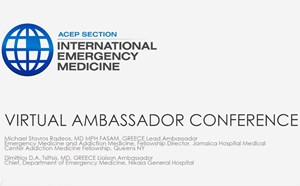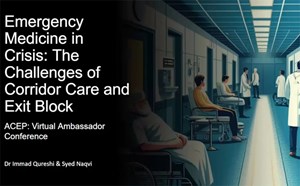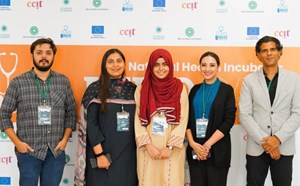Challenges in Emergency Medicine in Argentina
Watch this International EM Section Virtual Ambassador Conference webinar covering emergency medicine in Argentina. Dr. Adolfo Savia presents.
Read the Full Transcript
- Next slide. I'm going to speak to you about the reality of my country from Argentina. We are a very big country in South America with 45 millions of people living in Argentina with a huge country full of natural resources. But we have very serious economical problems. Not new, sadly, we are very used to have economical problems, but right now, during 2023, the inflation rate is like 200%. So it's a very critical situation. We are under a new government right now with a very different approach. So we are going to see what's going to happen. Argentina, is upper middle income country from the World Bank Classification but we have like 60% of our population under the line of poverty. So we are really in an emergency, a social emergency in Argentina. Next one, please. So the Argentinian health system is very interesting because all people in Argentina, even people from other countries like tourists, they all have the right to have free medical care in our country and complete medical care, not only emergency care. Free is a tricky word because someone has to pay it so free because the end user, the patient must not pay, but someone has to pay for it. And in Argentina we have different financing actors like public, the government and private parties, private organizations, prepaid organizations and unions are a very strong player in the health financing. Considering this, we are with extreme fragmentation of care because public health cannot treat all the patients and needs the health of the other financing actor. We, public health need the private medicine to work. Public health needs the union medicine we call it, or social help. They need to make it work because public health cannot give care to all the population. And our system is absolutely and completely fragmented. So if you have some kind of insurance and go to the public hospital, perhaps you are going to receive the emergency care, but you are going to be taken to another hospital and probably with no relation between systems. So it's a very complex health system and we are now under a staff crisis. We have doctors going to other countries, for example, to Chile, to Uruguay. And we have doctors going out the patient practice to move to pharmaceutical companies or to other kind of medical work. And we have also very few nurses in Argentina. So it's a very big staff crisis, especially in emergency areas. Very few people wants to be in this situation in the emergency room. So considering the sad numbers of inflations and poverty in Argentina, many people are losing their private health benefits and going to public health. So right now, especially public systems is absolutely, absolutely flood of patients. We are all with like 110% of our capacity used because all the patients are coming to the public system. Next one please. We have a very strong emergency medicine society in Argentina, the Argentinian Society of Emergency. It's founded in 2001, the last of our biggest crisis in Argentina with a lot of social riots during 2001. In that year, the Emergency Society of Argentina is founded. And in 2010, the Ministry of Health recognizes the emergency medicine as a specially a specialty in Argentina. Considering the critical need of doctors, of emergency doctors in Argentina, there are many training programs, residency programs and university programs. Also, the programs lead by the Society of Emergency Medicine. So there is many chances to get the specialty. We have this characteristic in our health system. All of pre-hospital system needs to have a doctor in an ambulance. We don't have paramedics like you have in the USA. We have university programs training paramedics with very high level and an important recognition. But right now, paramedic don't work like they do in United States. And we have a doctor in any ambulance in Argentina, but we have any doctor. So very few emergency specialists in Argentina are working in emergency departments and in emergency medical services. It's hard to think or to imaging a cardiac unit without cardiologists. But in Argentina we have lots of emergency departments and lots of ambulance without emergency doctors. And one of the many explanations we have for this is because we are having a growing violence going to the emergency units. Our emergency rooms, are constantly being attacked and being overcrowded. So we have a lot of violence troubles even in private hospitals. The fragmentation of care make the work very difficult for the doctor. And we have a very high rate of burnout, especially after Covid. We have a very rough time with Covid in Argentina. And of course we have a lot of boarding, we have a lot of corridor care and it's a very complex situation. And we have an extra, the payment per hour for a trainer emergency physician with specialty is less than $10 an hour. So, and much less than $10 an hour. So many of our very well-trained doctors are moving to Chile or Uruguay because it's completely different. The payment they receive. At the right is my hospital. The Pilar City Central Hospital is a very new hospital. We are very proud of our new hospital. Next please. This is the last one. This is an invitation we have in April, the FLAME conference with a very important international conference in Argentina. This year is going to be in Buenos Aires and it's organized by the Emergency Society of Argentina. And I was chatting with some of you that are coming to this conference, so we are waiting for you. This is a very good opportunity to learn from each others, to know my country and perhaps start thinking that many of us has, so, so the same problems. Even with different economical situation, with different access to resources, even with different experience because emergency medicine is a new specialty in Argentina. We have more or less the same problems. And we are now, for example, going back to the university to make the emergency medicine specialty. Like to grow in vocation, like a vocational like, and to grow the interest in undergraduate students because we really need more emergency doctor. We really need more nurses. We really need more emergency team members. Many of us, I'm sure all of us, we are here wanted to be a doctor, to save lives, to help people. And this is it. This is the moment in a country like mine with 60%, of people under the line of poverty. This is the moment to help. We have an incredible experience and I think this is the moment for emergency medicine to give the final sham, to get the final grow to go to all hospital, to take all emergency department and to grow as a specialty. So thank you so much and will be great to have you here in Argentina.



